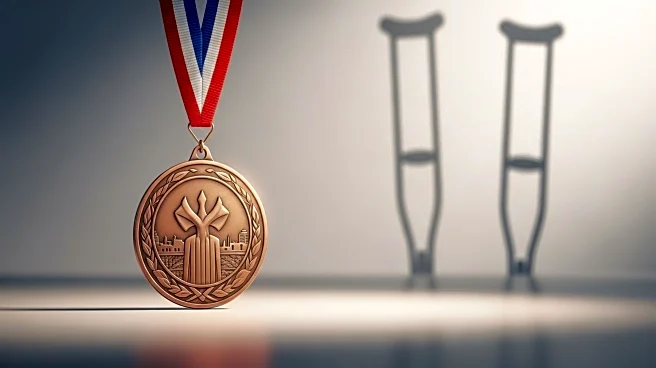What's Happening?
Bebe Jackson, a para-athlete and NHS worker, achieved a bronze medal in the 100m sprint at the IPC World Para Athletics Championships in Delhi, India. Jackson, who competes in the T44 classification for athletes with a single below-knee amputation or impairment, expressed her excitement and described the experience as 'mind-boggling.' Despite the challenges of balancing night shifts as a children's carer with professional training, Jackson succeeded in her debut at the world championships. She aims to inspire the children she cares for, encouraging them to pursue their dreams regardless of their disabilities.
Why It's Important?
Jackson's achievement is significant as it highlights the potential for individuals with disabilities to excel in sports and other areas of life. Her success serves as a powerful message to her patients and their families, demonstrating that disabilities do not have to limit one's aspirations. This can have a positive impact on societal perceptions of disability, promoting inclusivity and empowerment. Additionally, Jackson's story underscores the importance of support systems and role models in motivating individuals with disabilities to overcome challenges and pursue their goals.
What's Next?
Jackson's future plans may involve further participation in international competitions, potentially increasing her influence as a role model for disabled athletes. Her continued success could inspire more individuals with disabilities to engage in sports, leading to greater representation and opportunities in athletics. Additionally, Jackson's dual role as an athlete and NHS worker may encourage healthcare institutions to support employees in pursuing athletic endeavors, fostering a culture of inclusivity and personal development.
Beyond the Headlines
Jackson's journey from hospital settings to the world stage highlights the intersection of healthcare and athletics, emphasizing the therapeutic benefits of sports for individuals with disabilities. Her story may prompt discussions on the need for more accessible sports programs and facilities, encouraging policymakers to invest in initiatives that support disabled athletes. Furthermore, Jackson's experience could lead to increased awareness and advocacy for disability rights, promoting a more inclusive society.










